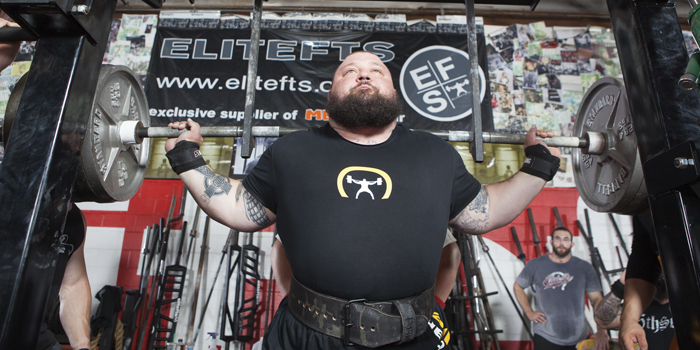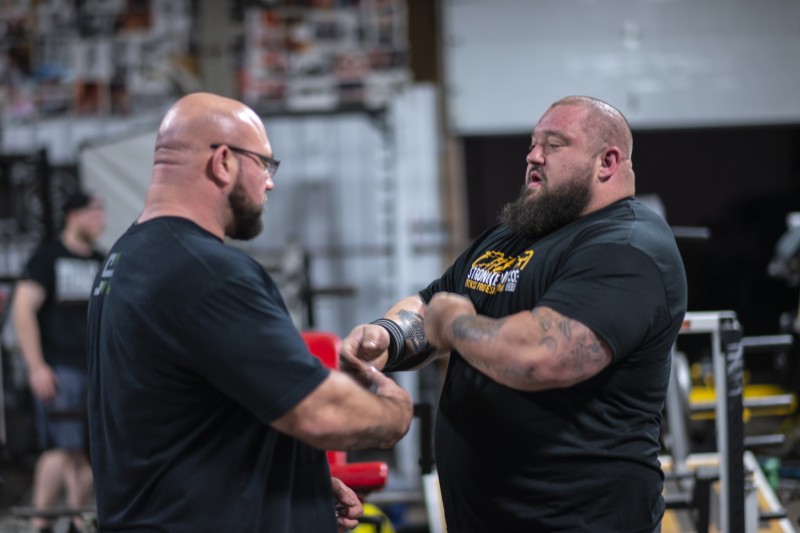
I played football until I was 30, and although I weight trained, I never cared or tried to get strong(er). I've written about my story of how and why I made the switch before, but if you haven't read it, to summarize, I went to a meet and was hooked. Instantly I hung up the cleats and started training. I didn't know a fucking thing about powerlifting. I found a copy of 5/3/1 and downloaded it for free (sorry, Wendler). I ordered the cheapest pair of knee and wrist wraps I could find. I picked a meet. I was 16 weeks out during my first week of "powerlifting training." I trained at an upscale health club that had a weight room in the basement with hex plates and typical 45-pound commercial gym bars — you know, the ones with no knurling and crazy whip. No chains, no specialty bars, no training partner, and damn sure no experience myself or around me to help. I didn't have a five-digit following on Instagram and my Facebook wasn't overrun with tagged content and people gassing me up.
RECENT: Take the Emotion out of the Bar
It was so easy to autoregulate my mind because I had one thing, and to this day it is still my number one tool: drive. I'd watch videos of world-class lifters and think to myself, "I can do that." Not once did I feel I needed to wait. I wanted to compete. If you run 20 yards alone and time it, then re-run it against your buddy who says he's faster, I'll bet the race has the quicker time. Early on in life, I learned I hate losing at anything. If we're sitting at a table folding towels, I'm going to keep track of how many you have finished and make sure I stay one ahead. I'm just wired that way. If you started folding faster and beat me, I'm knocking all the towels off the table and saying I don't even care about folding anyway. Yep, also a sore loser.
I always tell the story of my first meet, with the same joke: I was asked my rack height at weigh-ins and replied "six foot." I was embarking on an endeavor that I was clueless about, yet I wanted to be great. I could feel that burning in my belly (yeah, that's a lot of fire) and every squat session, every bench day, and every pull night stoked that fire. I was all in. 16 weeks came and went. I competed and totaled 1800 pounds via a 650-pound squat (got called on 700 pounds), a 445-pound bench, and a 705-pound deadlift at a bodyweight of 308 pounds. I won first place out of three guys — and even after all the congrats and atta-boys, I was disappointed. Brandon Lilly, who was at the meet and who at the time totaled 2237, told me to stick with it and that I had something that most didn't (or something along those lines). I left that meet, and I remember thinking when I got back to my hotel that I was going to out-total him. It was a fleeting thought that I never verbalized, but I thought it.

I never wore shirts that said Metal, Inzer, Slingshot or anything lifting related. I didn't carry a gallon of water everywhere. Hell, meet day I wore old Jordans and a wrestling singlet that was all black with a white patch on the back resembling a parachute. I looked absurd. Once I told someone about my meet and the response was, "Oh, I didn't know you lifted." My first thought was that I must be a fat fuck (which I was only fat fuck-ish then), but looking back I see why the lifters of today cover themselves in any and every company related to the sport. "Hey, look at me. I lift. You don't know me cause I suck, but I look like I'm the ATWR holder in every weight class."
Work ethic is dying and being replaced by how creative an Instagram post can be. Likes and views became the pounds that were once chased by men and women who couldn't live with being stagnant. 10,000 followers became the new total, and programs have been replaced by stunts to add to the newfound "total" (likes) of today's lifter.
Ask yourself, could you right now delete or deactivate all of your social media? Could you do the same if you were peaking for your next meet? Would you be as motivated to run yourself through the ringer for 10 weeks knowing you wouldn't get a single comment, like, or share? If you didn't answer these questions with a quick yes, maybe it's time to take a long look in the mirror. Think how hungry you were when you had 50 followers and knew them. Now there are so many yes-men, so many followers, so many clicks. To me it's a surefire way to get complacent, and complacency is the death of progress.
RELATED: Girls Who Lift For Power
We have so many subgroups within this "community" it's hard to keep track of what's who: gals who powerlift, Vikings who powerlift, poodle owners who powerlift, and on and on. This phenomenon, to me, is what killed the number. Everyone has a way to be accepted when at the end of the day it is (or was) all about the biggest number winning. I've seen men shoot bottle rockets out of their ass for views and women with "shorts" on using thirst trap camera angles from the rear all in an attempt to be accepted as a "powerlifter." Sadly, it works. Followers don't equal education or experience, yet these pages stay littered with regurgitated bullshit so misconstrued it's sickening. If you have 10,000 followers, your word is the gospel. No one stays the course, program hopping runs prevalent, and if a "top" lifter does well at the meet, the following week social media is being overrun with a whole new group of people running said lifter's program.
Everyone is in a huge hurry to get better, yet no one wants to live and learn. Lifters don't realize that so-and-so they follow online is an outlier. They don't realize that they could run any program with a tried and true battle-tested work ethic and make gains. The kicker is posting about "killing" and "killing it" — two very different things. It baffles me people think they can post themselves into a position to become great.











The terrible need to be accepted by virtual "friends" is terrible, to my taste, an addiction in fact.
Best regards from Mexico
Keep kicking ass fam!!!